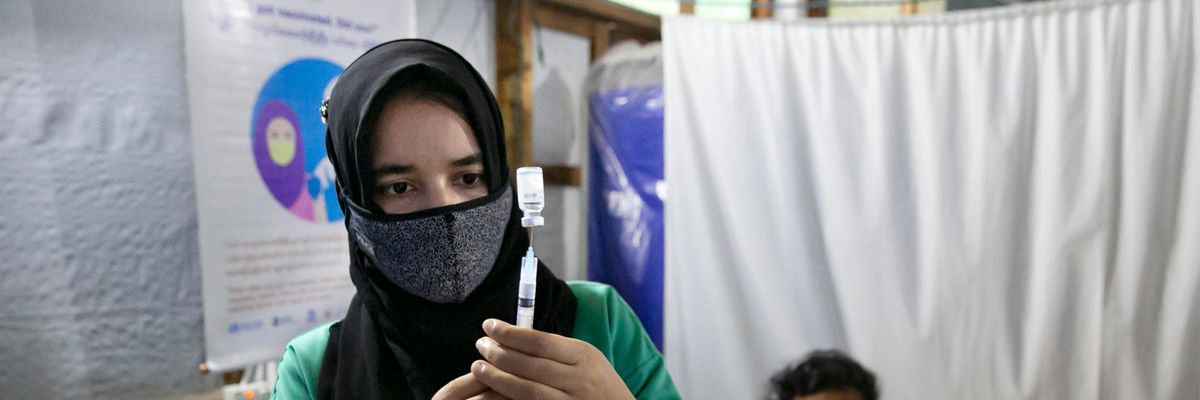
A nurse fills a syringe with a Covid-19 vaccine in a Rohingya refugee camp on August 11, 2021 in Bangladesh. (Photo: Allison Joyce/Getty Images)
To donate by check, phone, or other method, see our More Ways to Give page.

A nurse fills a syringe with a Covid-19 vaccine in a Rohingya refugee camp on August 11, 2021 in Bangladesh. (Photo: Allison Joyce/Getty Images)
"States must act together, in solidarity, to fairly distribute vaccines and help each other combat the impacts of Covid-19."
--Michelle Bachelet, U.N. High Commissioner for Human Rights
\u201c\u2018Data suggest that most people in the poorest countries will need to wait another two years before they are vaccinated against COVID-19.\u2019\u2014 @drtlaleng\u201d— the pfizer this time (@the pfizer this time) 1632861374
Trump and Musk are on an unconstitutional rampage, aiming for virtually every corner of the federal government. These two right-wing billionaires are targeting nurses, scientists, teachers, daycare providers, judges, veterans, air traffic controllers, and nuclear safety inspectors. No one is safe. The food stamps program, Social Security, Medicare, and Medicaid are next. It’s an unprecedented disaster and a five-alarm fire, but there will be a reckoning. The people did not vote for this. The American people do not want this dystopian hellscape that hides behind claims of “efficiency.” Still, in reality, it is all a giveaway to corporate interests and the libertarian dreams of far-right oligarchs like Musk. Common Dreams is playing a vital role by reporting day and night on this orgy of corruption and greed, as well as what everyday people can do to organize and fight back. As a people-powered nonprofit news outlet, we cover issues the corporate media never will, but we can only continue with our readers’ support. |
"States must act together, in solidarity, to fairly distribute vaccines and help each other combat the impacts of Covid-19."
--Michelle Bachelet, U.N. High Commissioner for Human Rights
\u201c\u2018Data suggest that most people in the poorest countries will need to wait another two years before they are vaccinated against COVID-19.\u2019\u2014 @drtlaleng\u201d— the pfizer this time (@the pfizer this time) 1632861374
"States must act together, in solidarity, to fairly distribute vaccines and help each other combat the impacts of Covid-19."
--Michelle Bachelet, U.N. High Commissioner for Human Rights
\u201c\u2018Data suggest that most people in the poorest countries will need to wait another two years before they are vaccinated against COVID-19.\u2019\u2014 @drtlaleng\u201d— the pfizer this time (@the pfizer this time) 1632861374